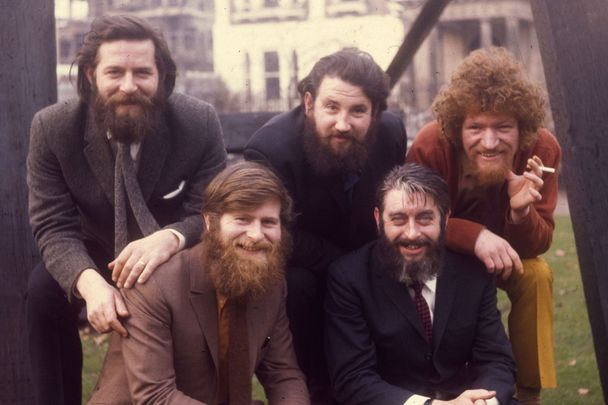Anyone lucky enough to be acquainted with the music of The Dubliners will be aware of the fact that there’s a song in the repertoire entitled “Salonika.”
It’s a jovial tune that unveils a socio-historical event of far-reaching proportions.
The first verse sets the stage for an inquiry that exceeds the scope of this article but I’ll do my best to convey the richness and audacity of the song.
The first verse—My husband’s in Salonika; I wonder if he’s dead. I wonder if he knows he’s got a kid with a foxy head—forges a connection between Ireland and Greece, evokes the tragedy of WWI, touches upon the economic realities of the previous century, and hints at the sexual politics of our (great?) grandmothers.
The chorus jauntily proclaims, So right away, so right away, so right away, Salonika, right away, me soldier boy. I have it on good authority (a Corkman) that the spelling of right that has come down to us is incorrect. In actual fact, someone needs to write away so that the singer can collect the separation allowance that was paid to the wives and children of soldiers who chose to have an allotment taken from their wages. These women were known as “separas” and were often held in contempt by their Irish compatriots.
Ireland in the first half of the twentieth century was embroiled in a struggle between Nationalists and Home Rulers. Without my going into great detail—and indeed there has been extensive commentary on this period of Irish history—the Nationalists supported separation from Britain while the Home Rulers were in favor of continued allegiance to the Crown. However, the case is never black and white (nor Black and Tan), and many Irishmen and women contributed to the war effort as a result of economic incentives even if their sentiments were not pro-British.
As for an Irishman in Greece, during the Great War, in October 1915 to be precise, the Sixth and Seventh Battalions of the Royal Dublin and Munster Fusiliers were sent to Thessaloniki to deter German invasion. Given the desperate conditions—hundreds died of malaria and are buried in Allied cemeteries here—and the incessant fighting—one account I read described how some Dublin Fusiliers were killed by their own artillery when they were caught between Allied bombardment and Bulgarian counter-attack—there was good reason for our singer to muse on her husband’s fate.
The subsequent verses consider issues closer to home and her disdain of slackers—a term for the men who chose to avoid enlistment: When the war is over, what will the soldiers do? They’ll be walking around on a leg and half while the slackers, they’ll have two…What will the slackers do? They’ll be all around the soldiers for the loan of a bob or two…for every kid in America in Cork there will be two.
She also expresses cynicism about the government—But still with all their taxes they can't beat the bloody Hun—and law enforcement officers—Why don't they tax the bobbies wi' their backs ag'in' the wall.
She saves some of her venom for men in general—For they takes us out to Blarney, they lays us on the grass, they puts us in the family way, and leaves us on our ass—but changes her tune (forgive the pun) or perhaps not with her final advice: And never marry a soldier, a sailor or a marine, but keep your eye on the Sinn Fein boy with his yellow, white and green.
The accompanying video was created to highlight the bond between Greek and Irish culture as seen from a contemporary perspective in the city of Thessaloniki.
* Originally published in 2021, updated in Aug 2023.
This article was submitted to the IrishCentral contributors network by a member of the global Irish community. To become an IrishCentral contributor click here.




Comments